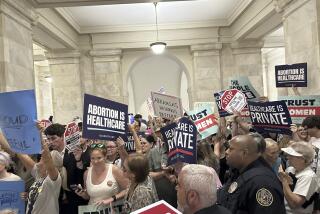Zeanah Wins Delay While Judge Rules on Petitions
- Share via
THOUSAND OAKS — Lawyers for Councilwoman Elois Zeanah won their first victory Thursday, with city officials promising a judge that they would not verify any of the recall petitions gathered against her until the court resolves whether the petitions are legally drawn.
City Atty. Mark Sellers and Mitchel B. Kahn, the lawyer for Yes! Remove Elois Zeanah, voluntarily agreed to the possible delay after Superior Court Judge Joe H. Hadden indicated he was inclined to formally grant Zeanah’s attorneys’ request for a temporary restraining order. Hadden also scheduled a full hearing on the issue for Feb. 28, when he will decide whether to issue a preliminary injunction.
Zeanah, who believes the petitions were designed to mislead residents, said she was happy the validity of the petitions will be examined in depth.
“What we’re trying to do is to get the law, which protects residents in these recalls, enforced,” said Zeanah, who attended the hearing with her husband, James.
Yes! Remove Elois Zeanah, the committee trying to oust the slow-growth councilwoman, has yet to turn in its signatures. The group said in a news release last week that it had collected more than 10,000 signatures. It needs signatures from 10,357 residents, or 15% of Thousand Oaks’ 69,047 registered voters, to place the recall measure on a ballot.
Even if the petitions are eventually ruled invalid, the ruling would not necessarily derail the recall drive. Supporters have 160 days to gather the needed signatures.
Frederic D. Woocher, a Santa Monica-based attorney who specializes in initiative and referendum law, and Raleigh H. Levine, an associate in his firm, filed a lawsuit against City Clerk Nancy Dillon on Monday charging that the format of the recall petitions violates state elections law.
They argued Thursday that much of the information that signature gatherers are required to provide appears on one side of the petition and the signatures appear on the other side.
That not only violates state laws, but could be misleading if residents are not aware what they are signing, Zeanah’s lawyers said.
That information includes the names of at least 10 of the people who signed the original petition to recall Zeanah, the group’s reason for doing so, and Zeanah’s full rebuttal.
“The law does say, specifically, that the signatures have to be on the same page,” Levine told Hadden at the hearing at the East County Courthouse in Simi Valley.
Sellers argued that Dillon received the paperwork to recall Zeanah in 1996, and was therefore applying the 1996 recall laws to the petitions, not the 1997 law, which is somewhat different.
He pointed out that Dillon sought the advice of the secretary of state’s office, the authority on recalls, before certifying the petition format.
“The petition was served in 1996,” Sellers said. “She reviewed that petition consistent with the law that applied in 1996.”
Sellers also argued that Dillon allowed some information to go on the opposite side of the page because it would have been physically impossible to include everything on the same side.
“There wasn’t any room,” he said.
Woocher and Levine disputed Sellers’ rationale, however, pointing out that the 1996 and 1997 recall laws are almost exactly the same when it comes to what information must be on the same side of the petition as the signatures.
“None of that should matter anyway,” Woocher said after the hearing. “The petitions were certified in 1997. That’s the important issue here. And the 1997 law specifically states that you should use the [petition] format outlined by the secretary of state’s office. These do not.”
Zeanah’s lawyers also ridiculed Sellers’ argument that there was no room to comply with the elections law guidelines.
“It’s an interesting excuse, since everyone must work under the same requirement, and dozens and dozens of petitions throughout the state were handed in that way,” Levine said.
Kahn, who told Hadden he had not been notified of the hearing until 6:30 p.m. Wednesday, said afterward that the entire issue seemed overblown.
“To me, it’s much ado about nothing, something splashing into the courtroom from the street,” Kahn said. “I don’t see the big offense here.”
More to Read
Sign up for Essential California
The most important California stories and recommendations in your inbox every morning.
You may occasionally receive promotional content from the Los Angeles Times.













